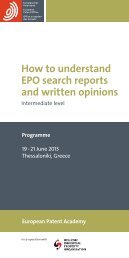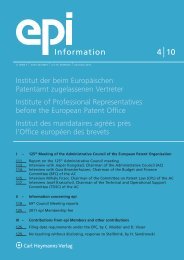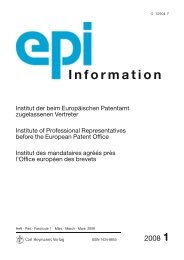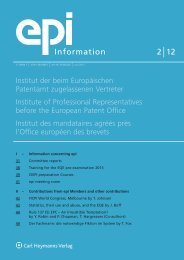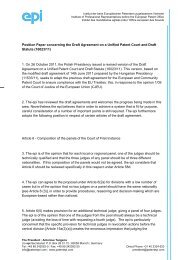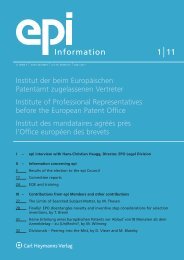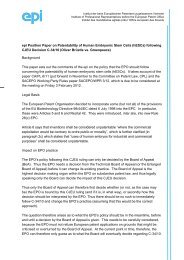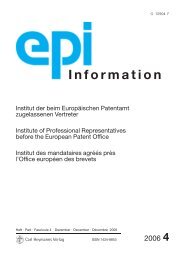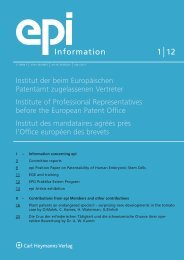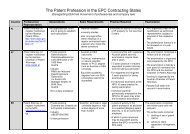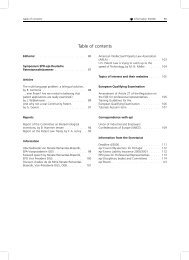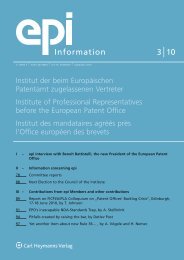epi Information 2/2009
epi Information 2/2009
epi Information 2/2009
You also want an ePaper? Increase the reach of your titles
YUMPU automatically turns print PDFs into web optimized ePapers that Google loves.
<strong>Information</strong> 2/<strong>2009</strong> Committee Reports 49<br />
proceedings by April 17 <strong>2009</strong> using the 1038 mechanism.<br />
3) Version 4 of the online filing software is currently<br />
being used for 94% of all filings. Users are reminded<br />
that version 3 will cease working on October 1,<br />
<strong>2009</strong>.<br />
4) Online fee payments also show slow continued<br />
growth: 35% of fee payments were made online<br />
in March <strong>2009</strong> (up from 33% in October 2008).<br />
12% were made using diskette submission (up from<br />
9%) and 10% using automatic debiting (up from<br />
9%).<br />
New Product Status<br />
1) eOLF Gateway: This will provide a connection<br />
between the data in users’ patent management<br />
systems (PMS) and the online filing software. The<br />
EPO development team is in contact with three<br />
providers of PMS systems and will provide certification<br />
to approved systems.<br />
2) Updates required for April <strong>2009</strong>fee changes: Mr<br />
Knauer apologised for the slight delay (about 5<br />
working days) in catering for the April 1 fee changes,<br />
the delay being attributable to the complexity of<br />
some of the changes. The fee changes are now fully<br />
taken into account in the software.<br />
3) Online Filing Browser Version (Portal Version): This<br />
will enable the user to employ a standard browser to<br />
communicate with online filing software hosted on<br />
an EPO server. This is planned only for standalone<br />
installations and there is no plan for a networked or<br />
group version. There is also no current plan to<br />
integrate with PMS systems. A pilot test will be run<br />
with a single company over the summer, with plans<br />
for general release in September <strong>2009</strong>.<br />
4) Secure Access to Mailbox and Unpublished Files: The<br />
objective is to have a mailbox which will receive<br />
electronic communications directed to the representative.<br />
Problems arise in ensuring confidentiality<br />
while also allowing other users from the same firm<br />
to access this mailbox, as well as in managing the<br />
data relationship between the application file and<br />
the smartcard owner (e.g. if a smartcard owner<br />
changes company but responsibility for an application<br />
is not to be transferred). It is envisaged that one<br />
mailbox will be provided per smartcard user, with<br />
administrators in a firm being permitted to assign<br />
redistribution and access rights among smartcard<br />
users. Implementation will not occur before 2010<br />
and will probably occur as part of the SPP initiative<br />
(see below).<br />
5) Machine Translations: The objective of this programme<br />
is to provide translations allowing comprehension<br />
of technical content, rather than providing<br />
legally effective translations. The current status is<br />
that machine translations are available into English<br />
from German, French, Italian and Spanish specifications<br />
via Espacenet (when viewing the text of the<br />
description or claims use the „Translate this text“<br />
button).<br />
Work is continuing on increasing the number of languages<br />
available for machine translation. Rather than<br />
using English as the sole „pivot language“ (into and from<br />
which all other languages are translated) it is now<br />
intended to also use French and German as pivot languages.<br />
Recent Problems encountered by <strong>epi</strong> Members<br />
1) Upgrading to version 4: The EPO commented that<br />
problems in upgrading to version 4 of the OLF<br />
software were almost always solved if the existing<br />
installation was first updated to version 3.20. Support<br />
staff in the EPO are fully aware of this issue and<br />
ready to advise users.<br />
2) Vista compatibility: Problems were reported by<br />
members using Windows Vista, as compatible<br />
smartcard drivers and libraries were not originally<br />
provided on the installation CD. The EPO confirmed<br />
that all new CDs now contain all of the required<br />
software for Vista.<br />
3) Register Plus: The timeliness of documents being<br />
available for viewing/download after the updating of<br />
the Register Plus data was again raised. EPO staff<br />
advised that the Register database is being fully<br />
rebuilt which will bring the two systems into line.<br />
4) Translations from non-European languages: It<br />
appears that Examiners have access to machine<br />
translations of Asian language documents (e.g.<br />
Korean) and sometimes rely on such translations<br />
without supplying the applicant with the translation.<br />
This is due to EPO personnel having restricted access<br />
to the facilities of foreign offices. It may require<br />
agreement at an inter-office level to allow distribution<br />
of the translations.<br />
5) Technical Support: OCC members reported difficulties<br />
and slow responses from EPO support. Online<br />
filing is now, for many users, a „mission critical“ part<br />
of their practice. The EPO confirmed that if a problem<br />
is preventing a user from filing or from meeting a<br />
deadline, it is viewed as critical and should be<br />
immediately escalated to Level 2 support where it<br />
will receive expert attention. It was suggested that if<br />
support problems were encountered, this could also<br />
be reported to the user’s Key Account Manager who<br />
would help with EPO support. It was reported that,<br />
in future, the intention was to have more comprehensive<br />
and topic-based web support to assist in<br />
resolving common queries.<br />
6) Confidential documents available for viewing: An<br />
example was given of a PACE request being publicly<br />
available, when such requests are supposed to be<br />
excluded from the public file. The error would<br />
appear to have arisen when the formality officer<br />
failed to flag the document as private. The EPO team<br />
suggested that they should prevent public and nonpublic<br />
submissions from being simultaneously filed,<br />
with PACE requests being flagged within the OLF



